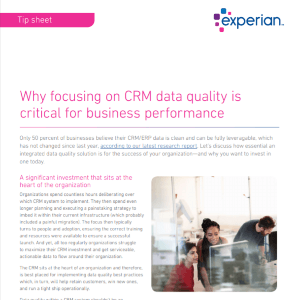- Products

Enjoy a free 30-day trial of our
data validation software.Experience the power of trusted data
solutions today, no credit card required! - Solutions

Enjoy a free 30-day trial of our
data validation software.Experience the power of trusted data
solutions today, no credit card required! - Partners

Enjoy a free 30-day trial of our
data validation software.Experience the power of trusted data
solutions today, no credit card required! - Learn more
- Pricing
- Contact Us
Why focusing on CRM data quality is critical for business performance
Only 50 percent of businesses believe their CRM/ERP data is clean and can be fully leveragable, which has not changed since last year, according to our latest research report. Let’s discuss how essential an integrated data quality solution is for the success of your organization—and why you want to invest in one today.
A significant investment that sits at the heart of the organization
Organizations spend countless hours deliberating over which CRM system to implement. They then spend even longer planning and executing a painstaking strategy to imbed it within their current infrastructure (which probably included a painful migration). The focus then typically turns to people and adoption, ensuring the correct training and resources were available to ensure a successful launch. And yet, all too regularly organizations struggle to maximize their CRM investment and get serviceable, actionable data to flow around their organization. The CRM sits at the heart of an organization and therefore, is best placed for implementing data quality best practices which, in turn, will help retain customers, win new ones, and run a tight ship operationally. Data quality within a CRM system shouldn’t be an afterthought. It should be a key piece of the planning and implementation cycle when investing in a new CRM.
The world moves forward but also stands still
For the last decade Experian has conducted a survey into global data management trends, and this year’s research, like all that have gone before it, presented key issues that will just not go away. Organizations believe that up to one third of their CRM data may be inaccurate and 55 percent of business leaders say they lack trust in their data assets, hurting their ability to be fully data driven. Poor quality data negatively impacts organizations across industries, regardless of their maturity. While data can be inaccurate for a wide variety of reasons, such as human error or natural data decay, the impact is the same.
We find 95 percent of businesses have seen impacts related to poor data quality (and the other 5 percent lack the ability to see that it’s hurting them too!). Wasted resources is often cited as the most common issue relating to poor CRM data quality, closely followed by poor decision-making due to damage caused to the effectiveness of analytics and the reputational issues that inaccurate data can throw up for businesses. Not to mention the daily interdepartmental headaches caused by missing or invalid data.
Tackle bad data up front and head on
So what is to be done? Below are some tangible tips that can help organizations tackle the issues related to poor data quality in their CRM applications:
1. Make data quality a priority when planning and implementing a CRM system
From the beginning adopt a data quality-first mindset. Research and understand what can be done and how. Make sure to build a business case for data quality by showcasing the impact of bad data with the leadership team.
2. Let technology do the heavy lifting
Utilize the ability to safety check data as it enters and flows through the CRM. Data quality tools for addresses, phones, and emails readily exist, as does the ability to periodically cleanse the database of duplicates and errors. Integrated tools have the ability to validate data in real time, and prompt users for corrections, or make the corrections on the fly.
3. Train CRM users, then train them again
Human error or the lack of human intervention is the single biggest factor affecting the quality of CRM data. Making sure the team is adequately prepared to use the CRM effectively is absolutely crucial to the downstream effectiveness of the system.
Hopefully, we’ve given you some considerations to support any upcoming CRM migration or, if an implementation has been completed and you’re not seeing the benefits, we would be happy to discuss ways that Experian can help.
